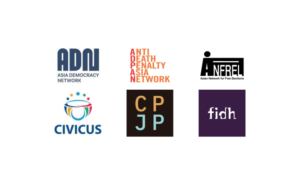 We, the undersigned civil society organisations, voice our deep concern regarding the 12th Parliamentary Elections in Bangladesh, which took place on 7 January 2024. The elections were neither genuine nor competitive and raised serious questions about its adherence to democratic principles and international election standards. Numerous reports and evidence point to widespread irregularities in the lead-up to and on election day, including voter suppression and manipulation of results, which severely undermine the fundamental principles of democracy.
We, the undersigned civil society organisations, voice our deep concern regarding the 12th Parliamentary Elections in Bangladesh, which took place on 7 January 2024. The elections were neither genuine nor competitive and raised serious questions about its adherence to democratic principles and international election standards. Numerous reports and evidence point to widespread irregularities in the lead-up to and on election day, including voter suppression and manipulation of results, which severely undermine the fundamental principles of democracy.
The deliberate silencing of opposition voices and curbing of political dissent leading up to the polls were alarming.1 Accounts detailing intimidation, unwarranted harassment, large-scale detentions on spurious charges, and acts of violence directed at the political opposition and their supporters depict a disconcerting electoral environment characterised by an entrenched abuse of authority. Law enforcement agencies adopted an unsettling approach, apprehending opposition figures and advocates nationwide.
The rights to freedom of association, peaceful assembly, and expression were selectively guaranteed to pro-government entities and individuals. In stark contrast, these fundamental rights were systematically and consistently restricted for opposition figures and dissenting voices.
The main opposition parties and alliances, including the Bangladesh Nationalist Party (BNP), Left Democratic Alliance, and the Ganatantra Mancha, boycotted the elections based on perceived biases within state institutions, notably the Election Commission, the evident favouritism in the electoral process, and the crackdown on opposition figures.2 Additionally, a large number of candidates withdrew from the race, citing these same concerns and issues.
Moreover, the electoral process itself was marked by countless reports of irregularities. The capturing of polling stations, where ruling party supporters used coercion, force or intimidation to take control of a polling booth to manipulate the voting process and ensure the victory of a specific candidate, and the ousting of polling agents of independent candidates were widely observed.3 Other instances of vote-rigging were also massively present in the forms of ballot-stuffing, casting of fake votes, and even instances of minors being hired by the ruling party to cast votes for ruling party candidates.4
The legitimacy of the 41.8% voter turnout’s official figure, reported by the Election Commission, is also questionable given that reports and eyewitness accounts from various polling stations across the country paint a contrasting reality.5 The citizens of Bangladesh deserve an electoral process that is transparent, accountable, and reflective of their collective will, and one that is respected and trusted by all parties.
We underscore the importance of a free and fair election as a cornerstone of participatory governance.
We strongly call upon the government of Bangladesh to take steps to hold a free, fair, participatory, and inclusive fresh election, with political consensus from all parties, under an impartial election management body and under a neutral interim government administration.
Further, we call upon the government of Bangladesh to release all political prisoners who have been imprisoned under fabricated cases simply for political dissent and to foster a civic space that allows individuals and groups to freely exercise their rights to freedom of expression, association, and peaceful assembly. There must also be independent investigations into: the excessive use of force by law enforcement agencies against protesters; the custodial deaths of opposition leaders and activists; and the attacks on journalists in the lead-up to the election and on election day.
Lastly, we appeal to the international community to push for a fresh election in Bangladesh that embodies the principles of freedom, fairness, participation, and inclusivity, resonating the genuine will of the Bangladeshi people.
We stand in advocating for an electoral process in Bangladesh characterised by accountability, transparency, inclusivity, and genuine competitiveness.
1) Asian Network for Free Elections (ANFREL)
2) World Alliance for Citizen Participation (CIVICUS)
3) International Federation for Human Rights (FIDH)
4) Asian Democracy Network (ADN)
5) Capital Punishment Justice Project (Australia)
6) Anti-Death Penalty Asia Network (ADPAN)









